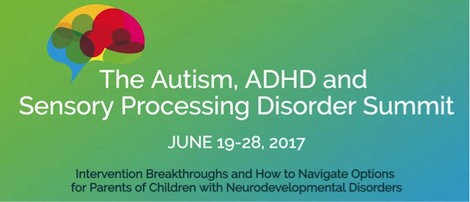I had the pleasure of being interviewed by Tara Hunkin on the upcoming Autism, ADHD and Sensory Processing Disorder Summit and share my expertise on anxiety since we so often see anxiety in this population. My topic is: Anxiety’s Role in ASD, ADHD and SPD and how nutrient therapy can help.
I start out sharing some of the research on the incidence and connections.
This 2009 paper Sensory Overresponsivity and Anxiety in Children With ADHD in the American Journal of Occupational Therapy, reports that:
Approximately 25% of children with attention deficit hyperactivity disorder (ADHD) have a comorbid anxiety disorder.
The purpose of this particular study was to determine whether sensory overresponsivity (SOR) or sensory processing disorders are related to increased anxiety in children with ADHD. There were twenty-four children between the age of 6 to 10 with ADHD and 24 children without ADHD.
The study concluded that:
Children in the ADHD + SOR [sensory over responsivity] group were significantly more anxious than both the ADHD-only and non-ADHD (control) groups.
Occupational therapists treating children with ADHD and SOR should be aware that these children may also have anxiety and discuss options with families for prevention or treatment.
I would add that anyone working with these children should be aware of the connections: doctors, nutritionists, psychologists and anyone else on the health team.
We also discuss this 2012 paper, also from the American Journal of Occupational Therapy – Sensory Overresponsivity and Anxiety in Typically Developing Children and Children With Autism and Attention Deficit Hyperactivity Disorder: Cause or Coexistence?
Reviews of the coexistence of ASD [autism spectrum disorder] and anxiety disorders have concluded that among children and youth with ASD, anxiety disorders are highly prevalent, clinically significant, and varied as to specific type of anxiety disorder
Approximately 25% of children with attention deficit hyperactivity disorder (ADHD) also have anxiety disorder, a rate that is elevated when ADHD is seen in conjunction with conduct or oppositional defiant disorders
The paper mentions these 3 factors as models worthy of further study in order to understand the relationship between anxiety, sensory overresponsivity, autism and ADHD:
(1) anxiety caused by, or a symptom of, SOR (primary anxiety model);
(2) SOR caused by, or a symptom of, anxiety (primary SOR model); and
(3) the presence of both anxiety and SOR, linked by way of another factor
Based on what I know about anxiety I feel it could be a combination of all of the above.
My interview also covers the following around how to address the anxiety in these children and their moms (who also often have anxiety):
- Low serotonin anxiety, symptoms, using tryptophan and 5-HTP and precautions with using them with an SSRI
- A young girl with RAD (reactive attachment disorder) with rage/anger, anxiety, insomnia, and sugar cravings and the successful use of chewable tryptophan, addressing low iron and a gluten-free diet
- A young boy with OCD and the successful use of both tryptophan and inositol
- Low GABA anxiety, the use of GABA and not phenibut, and cautions about using too much
- A young girl with ADHD and irritability and the successful use of GABA
- Pyroluria incidence and symptoms and how it ties back to neurotransmitter imbalances
Sensory processing disorders, ADHD and autism are not my expertise and I don’t work much with children so I’m really pleased to be bringing you this information via the other amazing speakers AND listening and learning myself!
Here are some speakers and topics I’m particularly interested in
- Brandon Brock, RN, DC: Understanding PANS and PANDAS role in ASD, ADHD and SPD.
- Elizabeth Mumper, MD: Mitochondrial Dysfunction: What it is and how to address the underlying causes.
- Richard Frye, MD, Ph.D.: Cerebral Folate Deficiency: and how it impairs neurological health.
- Nancy O’Hara, MD: What you need to know about cell danger response in ASD & other neurodevelopmental disorders.
- John Tjenos, NTP: The importance of the vagus nerve and how to build vagal tone with essential oils.
We have so much to learn from practitioners and researchers working in this area. And children affected by these conditions do recover!
The Autism, ADHD and Sensory Processing Disorder Summit, hosted by Tara Hunkin, NTP, runs from June 19-28, 2017.
It will be 10 days of eye opening information into the root causes of your child’s neurological dysfunction. Imagine learning about what may have caused their symptoms and how to address them with nutrition and biomedical approaches and leverage the power of positive neuroplasticity to improve function, health and their lives.
Do also keep in mind that these topics may have relevance for you even if you don’t have a child with a sensory processing disorder, ADHD and/or autism. These children are the canaries in the coal mine and many of my clients with anxiety can benefit from the biomedical support that many of these speakers are addressing. Simply replace sensory processing disorder, ADHD and/or autism with anxiety and listen and learn.
You can register for The Autism, ADHD and Sensory Processing Disorder Summit here
Feel free to ask questions or provide feedback and your experiences in the comment section below.

